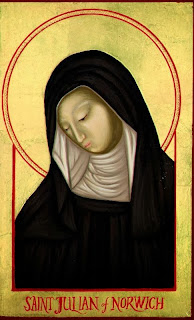“Almighty
God, you have knit together your elect in one communion and
fellowship in the mystical body of your Son Christ our Lord: Give us
grace so to follow your blessed saints in all virtuous and godly
living, that we may come to those ineffable joys that you have
prepared for those who truly love you; through Jesus Christ our Lord,
who with you and the Holy Spirit lives and reigns, one God, in glory
everlasting. Amen.”
I didn't grow up with saints.
Actually, that's only half-true. I grew
up in a world full of saints, but they were relegated to hospitals,
football teams, and large cities in Missouri. The only time saints
ever came into contact with religion in my world was when their monikers graced
the signage of what I could only presume were empty and decaying
churches, built during the age before we figured out the Bible and found history to be a useless addendum.
As I grew older, my naivete lessened
enough for me to connect the dots a little better. It finally dawned on me
that the St. Mary's University that I watched play basketball was
named after Jesus' mother Mary and that St. Louis was, presumably,
named after a gentleman named Louis who was somehow especially holy.
 However, even this realization didn't
fully resonate. The names, even the concept of sainthood, felt like a
relic from another time. The idea of someone being a “saint” felt
about as real to me as the concept of someone being a “king.” In my
world, these were the words of a quasi-Arthurian time, a time
distant, mystical, and perhaps even fictional. In my mind, saints
were little more than the church's version of superheroes, before they
started wearing tights and being cool.
However, even this realization didn't
fully resonate. The names, even the concept of sainthood, felt like a
relic from another time. The idea of someone being a “saint” felt
about as real to me as the concept of someone being a “king.” In my
world, these were the words of a quasi-Arthurian time, a time
distant, mystical, and perhaps even fictional. In my mind, saints
were little more than the church's version of superheroes, before they
started wearing tights and being cool.
I don't remember exactly when all this changed. I wish I knew the moment when the past went from being a
fiction to an omnipresent reality. But mine isn't a story of “Aha”
moments, it's a story of slow progressions that only seem clear in
retrospect.
Somewhere along the way, in the midst of
conversations and books and college history classes and hours of
research about topics I've long since forgotten, the world began to
move and reality began to shift. Megachurches morphed into
cathedrals, praise bands transformed into prayer books, and the words
and lives of those who had died more than a millennium before I was
born began to resonate within me.
I am not the perfect person to write
this. I'm not a mystic. I have no icons or candles or crosses
decorating my room. I'm terrible at prayer and I can barely sit still
for ten minutes. I am no one's idea of a saint.
 But none of that keeps the saints from
speaking to me or even, dare I say, being with me. St. Julian reminds me
of peace, hope and the breadth of God's love. St. Gregory tells me to
be humble and to help those in need. St. Athanasius helps me recall
not only that God made himself human, but that it was done so we
could become like God.
But none of that keeps the saints from
speaking to me or even, dare I say, being with me. St. Julian reminds me
of peace, hope and the breadth of God's love. St. Gregory tells me to
be humble and to help those in need. St. Athanasius helps me recall
not only that God made himself human, but that it was done so we
could become like God.
I don't know if this is how saints are
supposed to work. I've never been particularly adept at the mechanics
of orthodoxy. Remember, I didn't grow up with saints.
But then again, that's only half true;
I may not have been looking at them, but they were always there waiting for me.
Ben Howard is an accidental iconoclast and generally curious individual living in Nashville, Tennessee. He is also the editor-in-chief of On Pop Theology and an avid fan of waving at strangers for no reason. You can follow him on Twitter @BenHoward87.
Ben Howard is an accidental iconoclast and generally curious individual living in Nashville, Tennessee. He is also the editor-in-chief of On Pop Theology and an avid fan of waving at strangers for no reason. You can follow him on Twitter @BenHoward87.
You can follow On Pop Theology on Twitter @OnPopTheology or like us on Facebook at www.facebook.com/OnPopTheology.


No comments:
Post a Comment